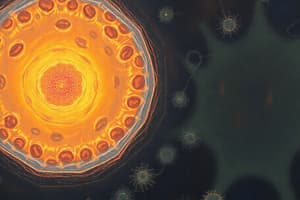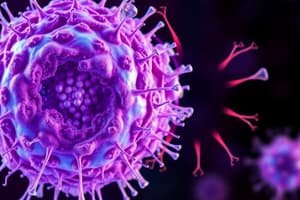Podcast
Questions and Answers
What is the primary function of the Golgi apparatus in eukaryotic cells?
What is the primary function of the Golgi apparatus in eukaryotic cells?
- Providing structural support for the cell
- Synthesizing proteins and lipids
- Sorting and modifying proteins and lipids (correct)
- Producing the extracellular matrix
Which protein structures make up the cytoskeleton in eukaryotic cells?
Which protein structures make up the cytoskeleton in eukaryotic cells?
- Mitochondria, ribosomes, and lysosomes
- Endoplasmic reticulum, Golgi apparatus, and lysosomes
- Nucleus, nucleolus, and chromatin
- Actin filaments, microtubules, and intermediate filaments (correct)
Which component of the cell is responsible for synthesizing proteins and producing lipids?
Which component of the cell is responsible for synthesizing proteins and producing lipids?
- Cytoskeleton
- Extracellular matrix
- Endoplasmic reticulum (correct)
- Golgi apparatus
What is the main function of the extracellular matrix in cell biology?
What is the main function of the extracellular matrix in cell biology?
Which organelle in eukaryotic cells is responsible for holding cells together through adhesion molecules?
Which organelle in eukaryotic cells is responsible for holding cells together through adhesion molecules?
What does the cytoskeleton provide in a cell?
What does the cytoskeleton provide in a cell?
Which of the following is a key feature that distinguishes prokaryotic cells from eukaryotic cells?
Which of the following is a key feature that distinguishes prokaryotic cells from eukaryotic cells?
What is the primary function of the molecular machinery within cells?
What is the primary function of the molecular machinery within cells?
Which of the following is a key characteristic of eukaryotic cells?
Which of the following is a key characteristic of eukaryotic cells?
What is the primary function of the cell's nucleus?
What is the primary function of the cell's nucleus?
Which of the following is a key difference between the structure of prokaryotic and eukaryotic cells?
Which of the following is a key difference between the structure of prokaryotic and eukaryotic cells?
What is the primary role of the cell's cytoplasm?
What is the primary role of the cell's cytoplasm?
Study Notes
Cell Biology: Understanding the Structural Basis of Life
Cell biology, also known as cellular biology or cytology, is the branch of biology dedicated to the study of the structure, function, and behavior of cells – the fundamental units of life. Cells are the building blocks of all living organisms, from bacteria to human beings. Cell biology is concerned with the intricate inner workings of cells, examining everything from the smallest molecular processes to the complex networks that govern their growth, maintenance, and reproduction.
An Overview of Cells
Cells are often compared to tiny factories, where molecular machinery carries out essential tasks necessary for maintaining life. These tasks include synthesizing macromolecules, processing nutrients, breaking down waste products, communicating with neighboring cells, and even responding to external stimuli. Despite their complexity, cells are remarkably uniform in their structure and function, with a standard organizational pattern common to all living organisms.
Prokaryotic and Eukaryotic Cells
Cells can be classified into two broad categories: prokaryotic and eukaryotic. Prokaryotes are single-celled microorganisms that lack a nucleus or any other membrane-bound organelles. They include bacteria and archaea, which are typically much smaller than eukaryotic cells. On the other hand, eukaryotes have cells with a nucleus and various specialized compartments called organelles. These larger, more complex cells are found in plants, animals, fungi, and protists.
Cell Structure and Function
The study of cell biology delves into the structure and function of these vital subcompartments within eukaryotic cells. For instance, the endoplasmic reticulum (ER) is an extensive network of interconnected tubules where proteins are synthesized and lipids are produced. The Golgi apparatus serves as a sorting and modifying station for proteins and lipids before they are transported to their final destinations. Additionally, the cytoskeleton, composed of protein structures like actin filaments, microtubules, and intermediate filaments, provides structural support and helps maintain the cell's shape and motility.
Extracellular Components and Cell Interactions
Cell biology also explores the extracellular environment surrounding eukaryotic cells, such as the extracellular matrix (ECM). This protective layer consists of fibrous proteins that provide mechanical strength and anchorage points for cells. Cell biologists study interactions between cells and their surroundings, including adhesion molecules that help hold cells together and signaling pathways that regulate communication between adjacent cells.
In summary, cell biology offers a comprehensive understanding of the intricate organization and functioning of cells, the fundamental units of life. By studying cells, scientists can gain valuable insights into the workings of both simple and complex organisms, providing a foundation for research in areas such as medicine, genetics, molecular biology, and beyond.
Studying That Suits You
Use AI to generate personalized quizzes and flashcards to suit your learning preferences.
Description
Test your knowledge on the structure, function, and behavior of cells - the fundamental units of life with this quiz on cell biology. Learn about prokaryotic and eukaryotic cells, cell structure and function, and extracellular components and cell interactions.




